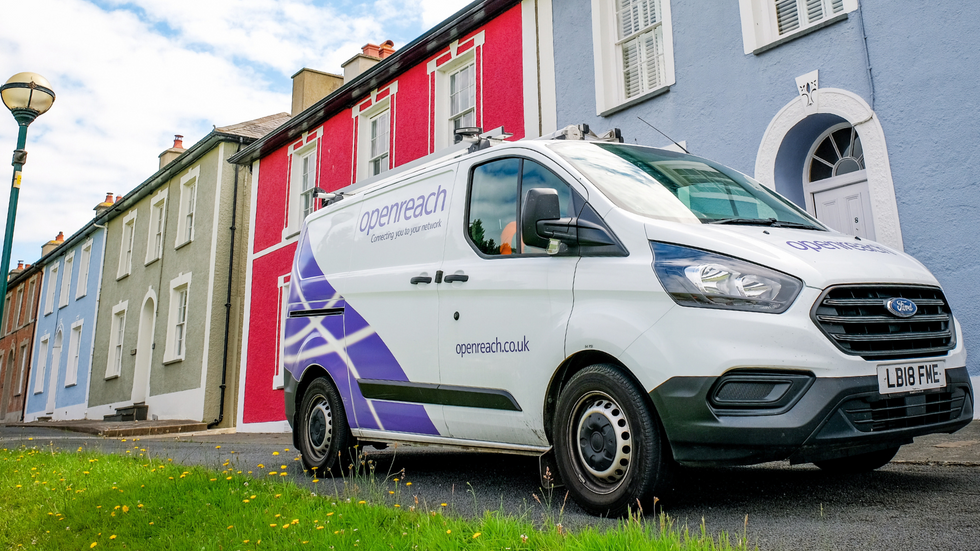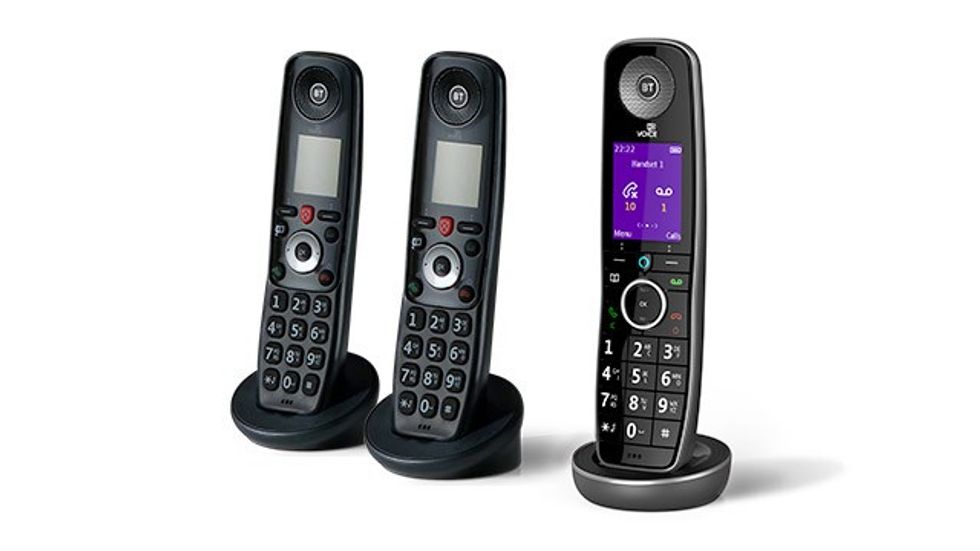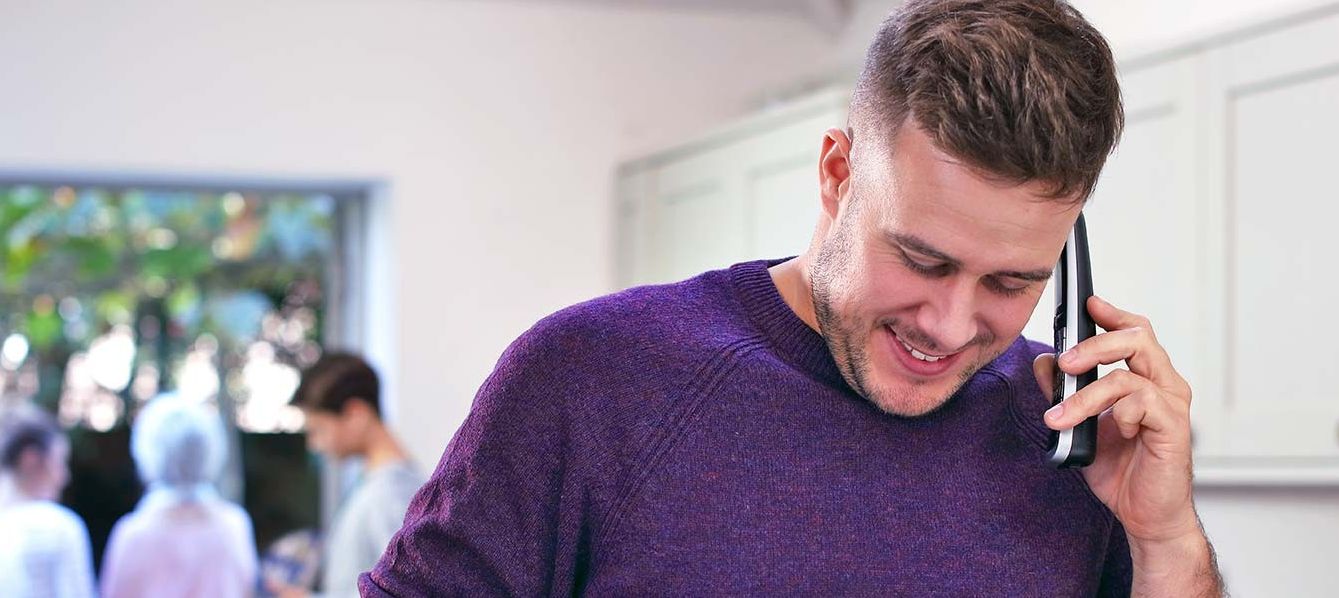Aaron Brown explains changes coming to traditional landlines across UK.mp4
Home phone lines from Virgin Media, TalkTalk, Plusnet, EE and other brands are also impacted
- Traditional UK copper-based landlines will be switched off by January 31, 2027
- The deadline was set by the biggest telecom providers in the UK
- BT, Virgin Media, and others want to upgrade to broadband-powered phones
- This uses VoIP technology, similar to Skype and WhatsApp
- They claim these all-digital landlines offer better call quality and fewer spam calls
- You'll also be able to place incoming calls in a queue and block withheld numbers
- BT, Vodafone, and TalkTalk all brand their internet-based phones as "Digital Voice"
- Personal alarms have run into compatibility issues with these handsets
Don't Miss
Most Read
Trending on GB News
How Britons make phone calls will never be the same again.
That's because BT, Virgin Media, TalkTalk and other telecom companies are in the process of switching off the 14 million or so copper-based phone lines across the UK that Brits have been using to make calls since 1911.
In their place, you’ll need to make your calls using a broadband-powered alternative known as Voice Over Internet Protocol, or VoIP. If you’ve ever made a call over Wi-Fi to friends or family on WhatsApp, Skype, or Messenger, then you’re already familiar with VoIP technology. BT, Virgin Media, and TalkTalk refer to this internet-powered landline as “Digital Voice”, but depending on your provider, they might use a different term.
Plans for a UK-wide landline switch-off were first announced back in November 2017.It's worth emphasizing that this is not a Government scheme or deadline, the proposal came from the industry itself. At the time, industry heavyweights said they were struggling to find parts to maintain and repair analogue phone lines as few companies are still making the components used by this Century-old system.
But it’s not just about the nuts and bolts to keep landlines working. As you already know if you’ve used WhatsApp to chat to someone on the other side of the planet, all-digital calls can offer much clearer calls, especially over longer distances.
Not only that, but features you’d usually associate with your mobile phone, like blocking calls from withheld numbers or putting incoming calls in a queue when you’re already talking on the phone, are all possible with these broadband-powered landlines.
The original deadline for the switchover from Century-old landlines to new broadband-powered phones was set for late 2025. However, following a slew of issues, which saw BT customers lose access to the landline number they’d held for 50 years, others stranded without a landline connection for days, and a small number of vulnerable people with personal safety alarms left unable to contact emergency services— that deadline has been revised.
In May 2024, BT-owned Openreach confirmed rumoured plans to postpone the landline cull for an additional 13 months. The new deadline to move to broadband-powered phones across the UK will be January 31, 2027.
 Openreach, which is owned and operated by BT, maintains nationwide broadband and phone line infrastructure used by brands including EE, Sky, TalkTalk, Plusnet, and BT OPENREACH PRESS OFFICE
Openreach, which is owned and operated by BT, maintains nationwide broadband and phone line infrastructure used by brands including EE, Sky, TalkTalk, Plusnet, and BT OPENREACH PRESS OFFICE If you already have a full-fibre broadband plan with BT, TalkTalk, Plusnet, and other brands — nothing will change as the company has offered Digital Voice to fibre customers as standard for a number of years.
From September last year, BT confirmed that it had stopped selling copper-based products to all new customers. If you're unsure whether you're already using the newer system, the easiest way to check whether you're already using the new system is to look for "Digital Voice" branding on the handset or check whether it's plugged into the back of your Wi-Fi router or a landline socket.
10 key facts about the landline switch-off
- It's not just BT, with all UK landline providers moving away from analogue landlines
- The new technology relies on an entirely digital VoIP (Voice Over Internet Protocol) system
- VoIP is used to power WhatsApp, FaceTime, and Facebook Messenger audio calls
- Only BT uses the branding 'Digital Voice', with others launching their own equivalents
- Your landline number will not be changed during the switchover
- BT plans to complete its switch nationwide by mid-2024
- The traditional copper landline network will stop working in January 2027
- Existing broadband customers won't be charged extra after the switch
- Traditional landlines continue to work during a power cut as they draw power from the exchange
- But VoIP systems will not work during outages without a backup power bank

Three Digital Voice handsets from BT, the proprietary system created by the brand to offer VoIP calls to customers after copper landlines are retired in 2025
BT PRESS OFFICE
According to BT, there are 2 million customers across the UK using Digital Voice to make and receive calls. The areas where BT has already completed the switch to Digital Voice as as follows...
- Wiltshire
- Suffolk
- East Midlands
- Yorkshire
- The Humber
- Northern Ireland
- North West
- Greater London
- West Midlands
- South East
- East Anglia
The next areas of the UK set to be switched from traditional landlines are...
- North East – Summer 2024
- Scotland – Summer 2024
- South West – Summer 2024
If you live in one of these areas and haven't heard from BT yet — chances are, they'll be in touch very soon. BT says it aims to contact people at least four weeks before the deadline for the switch.
For most people, the switch will be seamless with 99% of existing landline phones set to work with the new standard. However, there are some customers who might have more trouble moving away from traditional landline technology.
Some people have been left without a working landline for weeks during the switchover, while others lost the home phone number they’ve had for decades.
But the biggest headache has been for the 1.8 million people in the UK who wear personal alarms around their necks to make an emergency call at the press of a button. Predominantly used by elderly or vulnerable people, these can make a life-saving call after a bad fall or during a health emergency.
While many of these will work seamlessly with broadband landlines, enough calls didn’t connect properly that BT, Virgin Media, and other telecom providers slammed the brakes on upgrades for anyone who didn’t want to switch or use one of these telecare devices.
Upgrade works have restarted since then, but not before the biggest providers agreed to a new set of guidelines to guarantee vulnerable people with alarms will never be left without a working device during the switchover process.
 Digital Voice handsets connect directly to the Wi-Fi router and use broadband to make and receive phone calls to landlines and mobile numbers worldwide BT PRESS OFFICE
Digital Voice handsets connect directly to the Wi-Fi router and use broadband to make and receive phone calls to landlines and mobile numbers worldwide BT PRESS OFFICE BT has admitted that those without a broadband connection at home, or who live in an area with no mobile signal (as back-up should the Digital Voice line go offline), or wear healthcare pendants that require a landline will likely find the transition more complicated.
To ensure everything runs smoothly, we've answered some of the most common questions below.
“For almost everyone, moving to Digital Voice will be a simple and free transition with no home installation work required,” said Vicky Hicks, Senior Engagement Manager at BT. “If you feel you need additional support with the transition or you think you are vulnerable, please do tell us. We will be with you every step of the way.”
Why are landlines being changed in the UK?
Telecom providers, like BT, are switching customers away from traditional analogue landlines to a new digital alternative. Since 1911, copper wire has been the backbone of connectivity across the UK – but its time is finally over.
Openreach, which manages the broadband and phone infrastructure across the UK, will switch off the copper cable network in 2025.
The switch was kickstarted because copper landlines were deemed no longer fit for purpose.
That's because broadband-powered VoIP offers clearer quality calls, but it's a change driven by the general shift across the industry. The majority of phone manufacturers and suppliers now produce digital-only equipment, which will not work with traditional copper landlines. Without these upgrades, customers could order a home phone online and find it incompatible with their BT landline.
BT customers over the age of 70 are not proactively switched to Digital Voice, the company has reassured. But since July 2023, BT has started to trial switching customers aged between 70-74 who live in urban areas and have the latest broadband hub and don't regularly make landline calls. According to BT, these trials have gone well to date, with 98% of customers choosing to make the switch.
When should you contact BT about your landline switch?
There are some circumstances where it's worth reaching out to BT ahead of the switch to ensure that you have all of the right equipment and advice. If you rely on critical healthcare equipment that's designed to work with your landline, BT might need to supply additional hardware to keep everything working as expected.
If you meet any of the following criteria, BT advises that you reach out to ensure they get the right support from the company...
- Customers who wear a healthcare pendant
- Customers with no broadband connection
- Customers who live in an area with no mobile signal
- Customers who have previously disclosed additional needs to BT
What happens during a power cut?
This is one area where the new VoIP landline system falls down compared to its copper-powered predecessor. Traditional landlines can continue to work even if there's a power outage as the telephone line draws its power from the nearest exchange, which has a backup to keep people connected.
If you've ever tried to stream a show, send a message on WhatsApp, or search on Google during a power outage - you'll be aware that the same is not true of broadband infrastructure.
BT is offering to send a battery pack to some of its most vulnerable customers, which will enable them to continue to make and receive calls during a power cut. If you have previously disclosed additional needs to BT, then make sure that you are sent a battery during the switchover process.
If you're not eligible for a complimentary battery pack from BT, then these are available to purchase from a host of high street and online retailers.
Countdown to the death of traditional copper landlines
1992 – Introduction of the first dial-up internet service to UK customers, Pipex
2000 – First UK home broadband launches in the UK ...and is taken up by a single customer in Essex
2008 – First residential full-fibre broadband connection goes live in a housing development in Ebbsfleet, Kent. It becomes the first place nationwide to use fibre-optic cables directly to the home, with telephone services and broadband delivered over the same cables
2010 – Services with speeds of 30Mbps (megabits per second) are sold in the UK. With this rate of speed, internet users can download or stream music, games or TV shows
2013 – The first ‘fibre only’ exchange goes live in Deddington. The Oxfordshire village was chosen as a pilot location for the first fibre-only exchange
2018 – Plans to retire the old telephone network within seven years are announced. This will see everyone in the UK upgraded to a digital phone line, laying the foundations for the future
2019 – Salisbury becomes the first "Openreach Full Fibre" city in the UK. The Wiltshire city has the fastest citywide network in the UK
2020/23 – Openreach ends the sale of copper landlines, beginning at an exchange level and then nationally. From September 5th 2023, BT customers across the UK could no longer buy traditional phones
2025 – Retiring the old analogue phone network. By this time, everyone in the UK will be upgraded to a digital phone line – which will use the broadband network to make calls in a similar way to other Voice Over Internet Protocol (VOIP) technologies like Skype, Facetime, and Microsoft Teams









